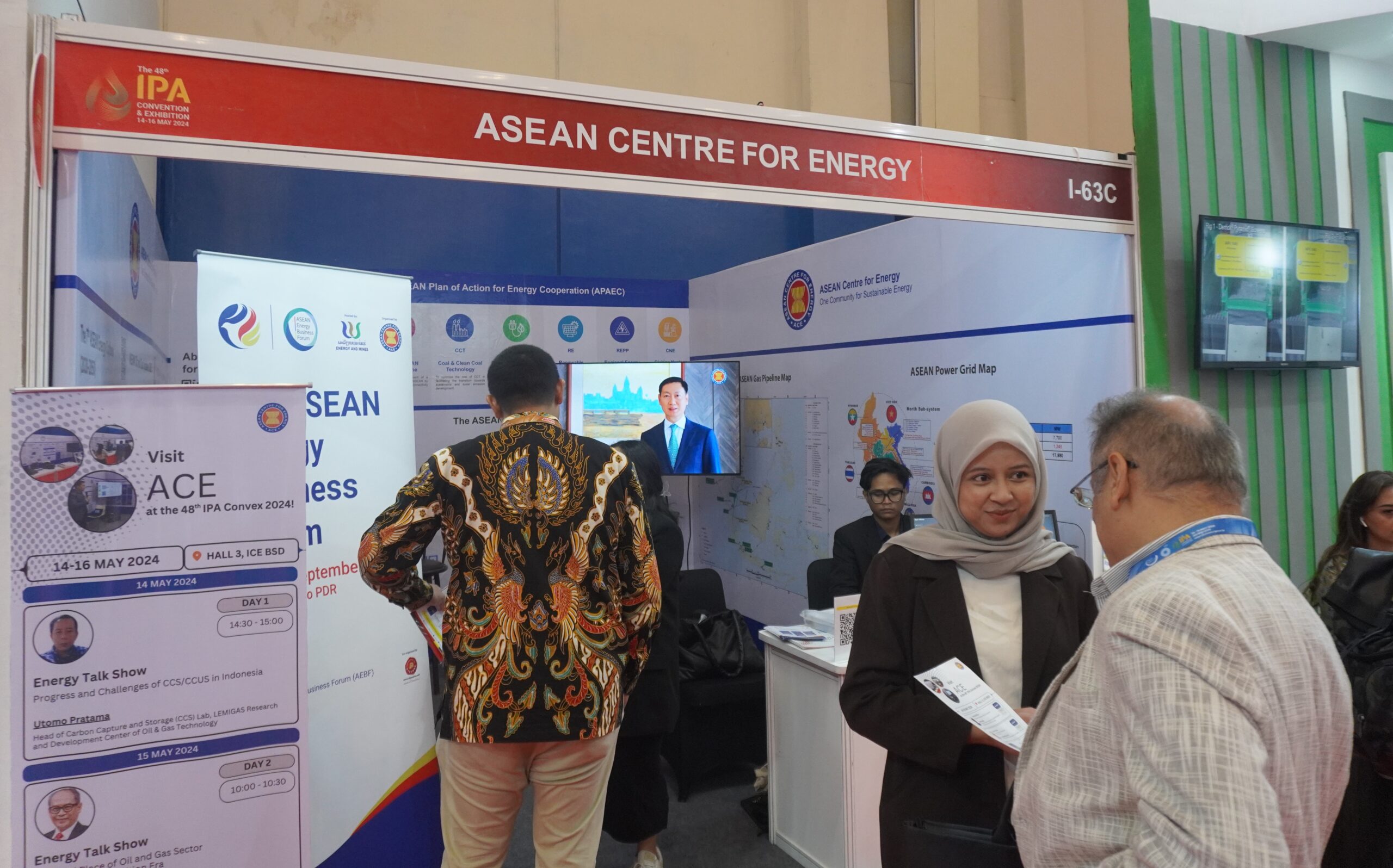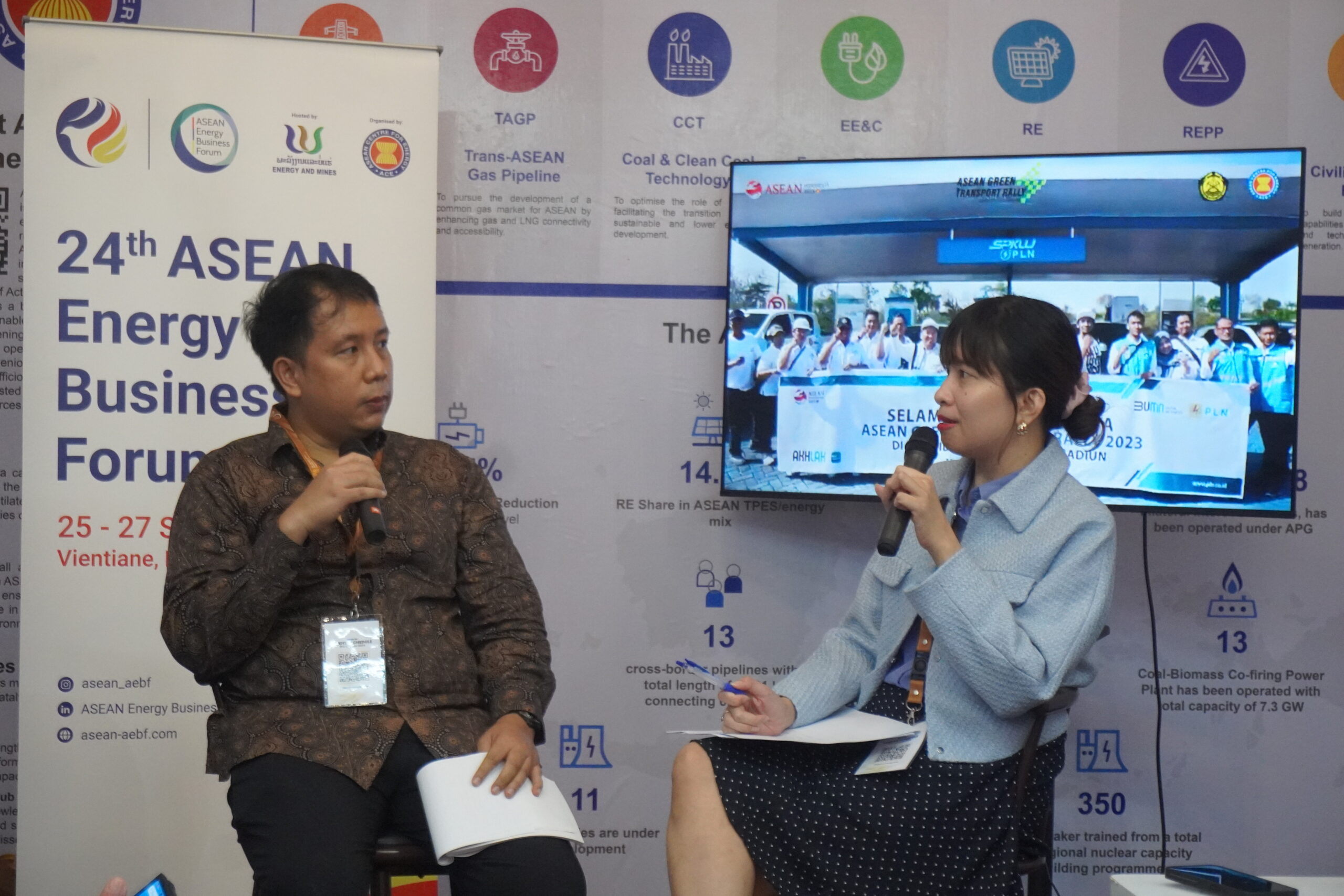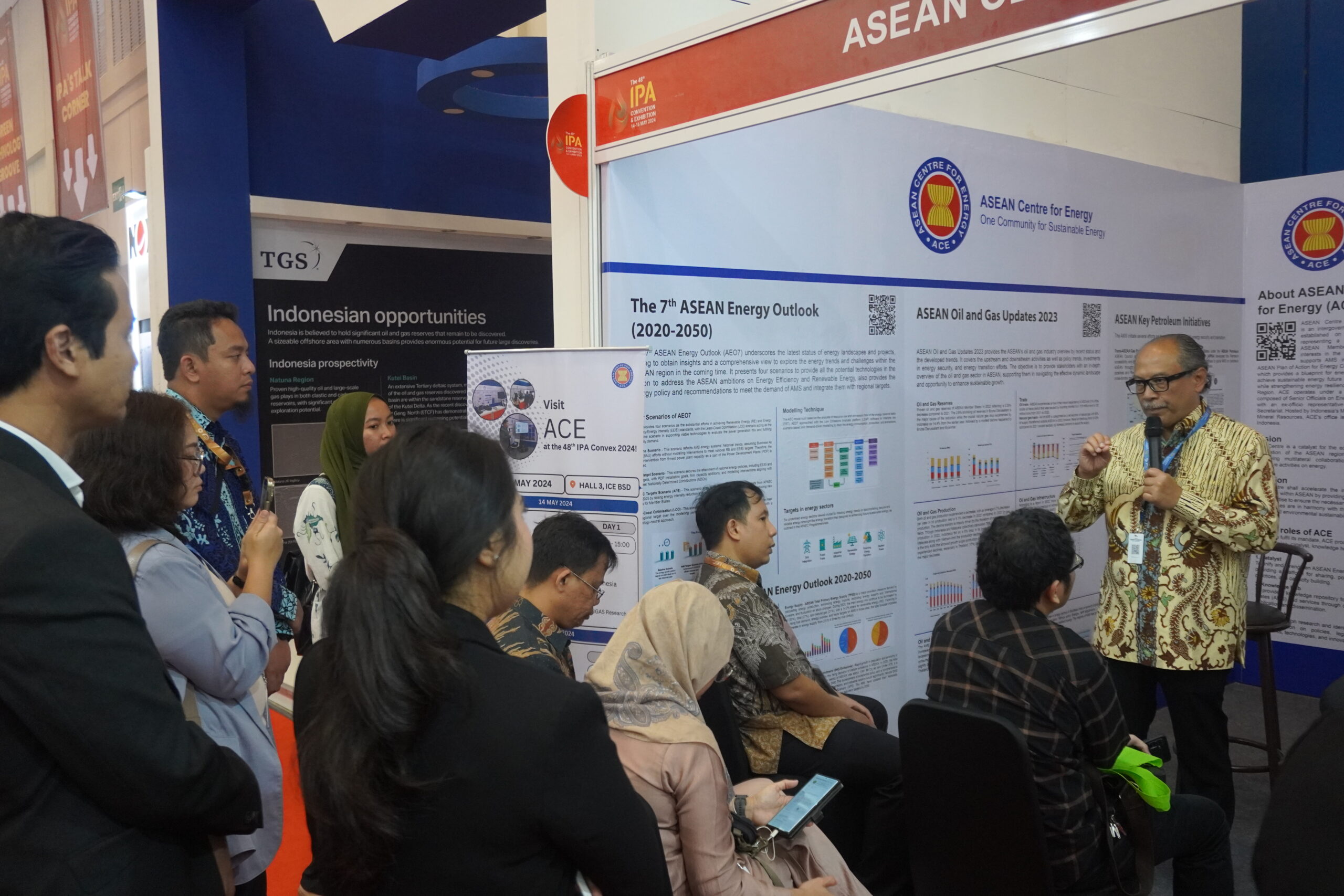Menu
The 48th Indonesian Petroleum Association (IPA) Convention and Exhibition (Convex), held from 14-16 May 2024 at the Indonesia Convention Exhibition (ICE) in BSD, Tangerang, Indonesia, stands as Southeast Asia’s most significant oil and gas industry event. It gathers industry professionals, government representatives, academics, and other stakeholders to discuss the latest trends, technologies, challenges, and opportunities in the sector. The convention features a variety of activities, including technical presentations, panel discussions, workshops, networking sessions, and exhibitions showcasing products and services related to the oil and gas industry.

Photo 1. ACE Booth at the 48th IPA Convex
ASEAN Centre for Energy at IPA Convex
ASEAN Centre for Energy (ACE) participated in the 48th IPA Convex by establishing a booth at the exhibition venue to showcase ACE’s role as the official ASEAN think tank, catalyst, and knowledge hub in the energy sector. The booth showcased various ACE publications, including the 7th ASEAN Energy Outlook, ASEAN Oil and Gas Updates 2023, ASEAN Energy in 2024, and many others. A major highlight of ACE’s participation was the Energy Talkshow series held at the booth.
Energy Talkshow on CCS/CCUS Progress and Challenges in Indonesia
On 14 May 2024, ACE hosted a talk show titled “Progress and Challenges of CCS/CCUS in Indonesia,” featuring Utomo Pratama, Head of Carbon Capture and Storage (CCS) at LEMIGAS. Aldilla Noor Rakhiemah, Senior Analyst of the Power, Fossil Fuels, Alternative Energy and Storage (PFS) Department at ACE, moderated the session.
During the session, Utomo discussed the ongoing CCS projects in Indonesia, noting successful field trials in the Gemah field in Sumatra, operated by PetroChina, and the Jati Barang field, operated by Pertamina. These trials, conducted in partnership with international organisations such as the Global CCS Institute, Commercial Law Development Program (CLDP), and the American CCS Center, demonstrated increased oil production due to CO₂ injections, indicating the feasibility of scaling up CCS technology.

Photo 2. Energy Talkshow on CCS/CCUS Progress and Challenges in Indonesia
He emphasised that the primary motivation for operators to adopt CCS/CCUS technology is the dual benefit of enhanced hydrocarbon recovery and reduced emissions. The regulatory frameworks in Indonesia allow for the cost recovery of CCUS-related expenses, making it an attractive option for the oil and gas sector. This combination of economic and environmental benefits supports the broader adoption of CCS technology.
A significant initiative highlighted by Utomo is the project by Pertamina and ExxonMobil to construct a CCS hub in the Sunda Asri Basin. This hub is aimed at injecting CO₂ into saline aquifers rather than depleted oil and gas fields, showcasing Indonesia’s commitment to sustainable energy practices. This project underscores the country’s strategic efforts in advancing CCS technology.
Additionally, the Ministry of Energy and Mineral Resources of Indonesia (MEMR) recently published an official CO₂ storage resource map, indicating Indonesia’s substantial capacity for CO₂ storage across various geological formations. The map reveals that saline formations can store approximately 470 gigatons of CO₂, while depleted fields have a capacity of nearly 5 gigatons. This information is crucial for guiding investors interested in low-carbon technologies and highlights Indonesia’s potential for large-scale CO₂ storage projects.
Utomo also highlighted several challenges that need to be addressed for the successful implementation of CCS projects in Indonesia. One major challenge is building technical expertise and addressing uncertainties related to subsurface geology. The complexity of geological formations in Indonesia means that careful site selection and detailed geological assessments are critical. To overcome these hurdles, it is essential for Indonesian companies to learn best practices from global CCS initiatives and develop the necessary technical skills.
Another significant challenge is the high investment and operational costs associated with CCS projects, which are more expensive than renewable energy alternatives. Despite these higher costs, the regulatory environment in Indonesia is supportive. Comprehensive regulations such as MEMR Regulation No. 2/2023 and Presidential Regulation No. 14/2024 provide a framework that facilitates the development of CCS projects, offering some relief and encouraging investment in this vital technology.
A more comprehensive analysis of the significance of cross-border CO2 transport in advancing CCS in ASEAN is presented in ACE’s newly released joint research paper, in collaboration with JOGMEC. The paper aims to understand the opportunities and challenges for cross-border CO2 transportation in ASEAN and offers several strategic recommendations for advancing CO2 cross-border transport and CCS in the region.
Talkshow on the Energy Transition
On 15 May 2024, ACE hosted the second Energy Talkshow, focusing on “The Role and Place of the Oil and Gas Sector in the Energy Transition Era.” The session featured Prof. Ir. Tutuka Ariadji, M.Sc, Ph.D., Professor of Petroleum Engineering at the Bandung Institute of Technology and former Director General of Oil and Gas at the Ministry of Energy and Mineral Resources of Indonesia (MEMR). The talkshow was moderated by Suwanto, Senior Research Analyst of the Power, Fossil Fuels and Alternative Energy and Storage (PFS) Department at ACE.

Photo 3. Prof. Ir. Tutuka on the Energy Talkshow, discusses the role of the oil and gas sector in the energy transition era
Prof. Tutuka emphasised the need for clear implementation strategies for CCS in Indonesia, highlighting the importance of designating a specific authority to issue CCS permits. This clarity is essential for advancing CCS projects and ensuring smooth regulatory processes.
He also discussed the potential for Indonesia to become a CCS hub due to its significant storage capacity and the possibility of cost reductions over time. Presidential Regulation No. 14/2024 on cross-border carbon transport supports this potential, indicating strong regulatory backing for Indonesia’s CCS initiatives.
Prof. Tutuka called for comprehensive legislation to govern CO₂ storage and transport, noting that the current regulatory framework lacks clarity on jurisdictional responsibilities. Clear and comprehensive laws are necessary to guide the development and operation of CCS projects.
Additionally, he advocated for setting emission caps for high-emission industries, regulated by the Ministry of Industry, and implementing a carbon tax to incentivise emission reductions. These measures would help control greenhouse gas emissions and encourage industries to adopt cleaner technologies.
Prof. Tutuka emphasised that CCS is vital for combating climate change, urging the industry to adopt practices that prevent greenhouse gas emissions and mitigate climate change impacts. He stressed the importance of preserving nature for future generations, highlighting CCS as a crucial technology in the fight against climate change.
ACE’s participation in the 48th IPA Convex 2024, through booth establishment and energy talk show, highlights the importance of international and regional collaboration, regulatory support, and technological innovation in addressing energy security, affordability, accessibility, and sustainability in the ASEAN region. The discussions at the IPA Convex 2024 set a clear agenda for the future of the oil and gas sector in the region, emphasising the need for continued investment in low-carbon technologies and sustainable practices.
